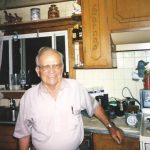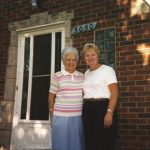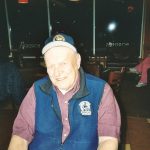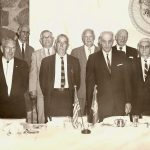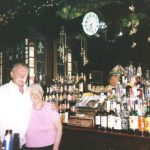 West Side Detroit Polish American Historical Society
West Side Detroit Polish American Historical Society
Interview with Manya (Abick) Soviak (“MS”), Detroit, MI 48210
With Manya’s Friend Greg Suski (“GS”) and Edward J. Sarna (“ES”)
August 1, 2007
INTERVIEWER: So we’re right here on the southwest corner of Michigan and Livernois. This building with the clock on it used to be Detroit Edison. It’s now Latino Legal Alliance. This is Wednesday, August 1, with Mr. Edward Sarna, and we’re doing our road tour. We’re driving south on Livernois. We’re now at Clayton. We’re heading over to Abick’s Bar to do our interview with Manya.
We just made a right on Dennis and we’re approaching Gilbert so we’re going west, and we’re right here on the corner of Gilbert and Dennis. And here’s Abick’s, right on the southeast corner.
We’re here on August the 1st at Abick’s Bar, and the address here is 3500 Gilbert. We’re here with Mr. Edward Sarna and with Manya, whose full name is-
MS: Manya Abick Soviak, S-O-V-I-A-K.
INTERVIEWER: And Manya, you are the current owner?
MS: My brother and I, I have a brother Walter Abick.
INTERVIEWER: And do you mind telling me your birth date?
MS: Mine is 10-4-23, and he’s February 1, ’21.
INTERVIEWER: Now, your parents were who?
MS: George and Kathryn Abick.
INTERVIEWER: Catherine with a “C”?
MS: “K.”
INTERVIEWER: And do you know their birth dates?
MS: September 17, but I can’t tell you the year.
INTERVIEWER: Okay.
MS: My mother was February 18, 1900.
INTERVIEWER: Okay. And did they emigrate from Poland?
MS: They came, my father came from Prague, my mother came from Maly Sacz/ Maloshons? [phonetic]. [INTERVIEWER NOTE: On February 1, 2008, Ceil Wendt Jensen researched the Urda name and found Katarina Urda of Austria, 20 years old at age of arrival in U.S., ethnicity Austria, last place of residence Austria, Wierschowna-mala, port of departure Hamburg, manifest line 0009.]
INTERVIEWER: And do you know about when they came over?
MS: Oh, gee, I don’t know. I know my father had to be here helping my uncle. My uncle came, I always say 1910, and then maybe he came in right after that. And my mother had to be maybe 1914 maybe, or ’13, something like that. [INTERVIEWER NOTE: On February 1, 2008, Ceil Jensen found George and older brother Joseph Abick in the 1910 U.S. Census in Detroit living on Gilbert, and George living at 3500 Gilbert in the 1929 City Directory; Austrian Poland (Galicia) was place of origin.]
INTERVIEWER: Okay. So your uncle had the bar.
MS: Yes.
INTERVIEWER: Your uncle built the bar.
MS: Yes.
INTERVIEWER: And your uncle’s name was?
MS: John Benske.
INTERVIEWER: How’s that spelled?
MS: B-E-N-S-K-E.
INTERVIEWER: And how is he related?
MS: Well, he was my godfather.
INTERVIEWER: Okay.
MS: They were very close, all of them. And his wife was my mother’s first cousin.
INTERVIEWER: Okay. And do you know what year the bar was built?
MS: No, I couldn’t tell you that. I should have looked it up for you.
INTERVIEWER: We can find out later. So he built it from scratch?
MS: Like I say, I always say 1910. So I don’t know if it’s ’10 or ’08 or whatever.
INTERVIEWER: Okay. So did your dad come specifically to help in the bar, or did he end up-
MS: No, he came, he ended up working at the bar. At that time when they came in they had to find something, anything. To work.
INTERVIEWER: Did your dad have siblings?
MS: My Uncle Joe, Joe Abick.
INTERVIEWER: Just the one brother?
MS: No, he had another one, and a sister, but they were back there. I wouldn’t know them.
INTERVIEWER: They stayed-
MS: Yeah.
INTERVIEWER: In Europe?
MS: Yes.
INTERVIEWER: And how about your mother?
MS: My mother’s brother was here already when she came. Michael Urda.
INTERVIEWER: Do you know how to spell that?
MS: U-R-D-A.
INTERVIEWER: Any other siblings?
MS: Not that I know of.
INTERVIEWER: Do you know what Michael did?
MS: He helped here, and then he went in the service.
INTERVIEWER: Do you know what branch of the service?
MS: Army.
INTERVIEWER: So where did your dad and mom live? Did they live right here upstairs?
MS: Upstairs, yes.
INTERVIEWER: And your uncle, too?
MS: My Uncle Joe? No, my Uncle Joe lived only a half a block away, then he moved to Hamtramck. He lived in Hamtramck. They had a little store there, a little grocery store on Playfair. That’s about all I can remember on that one.
INTERVIEWER: Did you say the street name?
MS: Playfair.
INTERVIEWER: Playfair.
MS: At that time that was what it was called, Playfair.
INTERVIEWER: So John Benske. And did he live upstairs, also?
MS: No, he lived next door.
INTERVIEWER: Okay. Did he own the house?
MS: Yes.
INTERVIEWER: Is the house still there?
MS: Yeah, two of them. He built this one next door, and the next one after that.
INTERVIEWER: Do you know the address?
MS: 3490 and 3484.
INTERVIEWER: Did he rent the houses out?
MS: They lived in one and then my other aunt and uncle lived in the other one.
INTERVIEWER: And your other aunt and uncle, were they relatives of John?
MS: Relatives of John’s wife.
INTERVIEWER: Do you know their names?
MS: Irene was my aunt. I can’t remember my uncle, I just called him Giva [phonetic].
INTERVIEWER: What did you call him?
MS: Giva [phonetic]. [Laughter]
INTERVIEWER: Okay. And when did John pass away?
MS: Oh, god. Oh, I can’t even tell you. My mother is gone, my mother passed in’64, and that was a long time before that.
INTERVIEWER: And when did your dad die?
MS: My dad died in 1935.
INTERVIEWER: Was your dad ill?
MS: Yes.
INTERVIEWER: He died young.
MS: Oh, yeah, 49. And my mom raised all four of us here.
INTERVIEWER: So then what do you remember about growing up? Did you and your siblings work in the bar? Were you always here in the bar?
MS: Well, no, when my mother and dad worked in the bar we were taken care of by-I can’t even think of her name. We called her Busia, and she took care of us. Oh, man, I can’t think of her name. What a wonderful person, too.
INTERVIEWER: Was this a relative?
MS: No, she was a stranger. Well, a friend. A real good friend of the family. Oh, the name. I can see her-her granddaughters used to come in, but I can’t even think of their names anymore.
INTERVIEWER: Where did you go to school?
MS: I went to Logan. We all did, in fact. All of us did.
INTERVIEWER: And then where?
MS: Southwestern.
INTERVIEWER: And where did you go to church?
MS: I went here to Ss. Peter & Paul.
INTERVIEWER: And did you speak Polish?
MS: I learned Polish a lot from-Russian, Polish, Ukrainian, I mixed them all up. [Laughter] They used to laugh at me like crazy. A lot of Polish people came in because they lived in the area. When they came from the old country they would come in and tell stories about what they did.
INTERVIEWER: But this was when you got a little older and you would come in the bar, you would hear all these stories?
MS: Yeah, oh, yeah.
INTERVIEWER: Was the bar always packed?
MS: [Showing old photograph on wall] That’s my Uncle Mike, and then that’s my Uncle John, and that’s my aunt, and that’s my dad.
INTERVIEWER: Oh, my gosh.
MS: [Showing another photograph] Yeah, and this is how it was on the outside, here. And this was a barber shop.
INTERVIEWER: Oh, my goodness. We’re looking at pictures, historic pictures of the bar on the wall.
MS: Yeah, and I still have the clock up there.
INTERVIEWER: Oh, my goodness, it’s beautiful.
MS: I had to cover this up so the kids, you know, with the pea shooters and bee-bees, and all that, coming from the schools.
INTERVIEWER: And this is more recent, of course.
MS: Yes.
INTERVIEWER: Oh, that’s beautiful. And this building now, today, that used to be the barber shop, what is that?
MS: Yeah.
INTERVIEWER: Just-
MS: It was a barber shop, it was a dress shop, it was a beauty shop, it was everything.
INTERVIEWER: But now is it being used at all?
MS: No. We were supposed to have a guy come in to look for it to rent as a little office he needed, but I’m still waiting for him.
INTERVIEWER: That’s a beautiful photo, a family heirloom.
MS: [Showing another photo] And that’s my mother and dad’s picture there when they got married.
INTERVIEWER: What year was that? Do you know?
MS: Nineteen-nineteen, I think.
INTERVIEWER: So then you started working in the bar officially when, about how old were you?
MS: Eighteen. You know, at that time you could work at 18 because it was family. You probably helped before that, but you know, you couldn’t do too much else. Now, you couldn’t do it.
INTERVIEWER: Did you ever have bands playing in the bar?
MS: We had one. I can’t remember the name of it. Oh, man, they played at all the picnics.
INTERVIEWER: Were they young guys?
MS: Young guys, yeah.
INTERVIEWER: Young kids.
MS: They were, 18, 19, 20, up to 22. They were good. [Laughter] You guys polkaed like crazy. [Laughter] Oh, man. [Laughter]
INTERVIEWER: Was it in the back room?
MS: Yes.
INTERVIEWER: So then when the war [World War II] hit, what was it like?
MS: All three of my brothers went. Thank God they came back, but a lot of boys didn’t come back.
INTERVIEWER: I imagine everybody who came in talked about what was going on during the war.
MS: We got letters from them all, all the time. One day a week I would sit down and write to everyone and tell them what was going on, who was where, and what.
INTERVIEWER: What were the main industries during that time in this area? I know there was Central Creamery.
MS: Yeah, then there was Federal Screw Works. Then we had a Black Label distributor on Livernois. The railroad.
ES: We had Goebel’s on 52nd.
GS: Goebel’s on 52nd?
MS: Yeah.
ES: In fact, where Joe’s house is.
MS: What was the one here in McGraw? I mean on Military, that factory that was there?
ES: There was a coal yard on Hammond, Hammond Coal Yard.
MS: Yeah, but the one here, right here on Military. I can’t remember the name. A lot of the girls worked in the office.
GS: Oh, that was Kelsey-Hayes.
MS: That’s it, Kelsey-Hayes. This was on Buchanan.
ES: Buchanan, coal yard on Buchanan. By the railroad tracks.
MS: Railroad tracks, yeah.
INTERVIEWER: That was Hammond, on Buchanan?
ES: No, Hammond was on Hammond.
MS: Hammond Street.
INTERVIEWER: So the one on Buchanan, you don’t know the name of?
MS: I remember the guy because the guy used to come in and drink.
INTERVIEWER: So Hammond Coal Yard was on Hammond and-
ES: Otis.
INTERVIEWER: During the war was everybody still able to find work?
MS: Oh, yeah. Everybody worked then. The women went to work, too. Everybody went to work.
West Side Courier was on Michigan Avenue.
ES: Otis Bakery, Lockwood Bakery.
MS: And then there was Pulanski on Otis.
INTERVIEWER: Pulanski Bakery?
MS: Yeah.
ES: But that was called Daily, first Daily Bakery.
MS: And then it was Pulanski.
GS: Didn’t Pulanski have one on Lockwood and Otis?
ES: No, that used to be Lockwood Bakery.
GS: Yeah, but Pulanski owned that one.
ES: Oh, I wouldn’t know that.
INTERVIEWER: Where did you shop for your-
MS: Groceries? That was a block away, it was-
ES: We had corner stores.
MS: Corner grocery stores. We had grocery stores on every corner.
INTERVIEWER: Do you know the name of it?
MS: I know one. One was Opalak.
INTERVIEWER: How do you spell that?
MS: O-P-A-L-A-K. What was this one here on the corner?
GS: It was-Freizel’s [phonetic]. What was Freizel’s [phonetic] store called? Because I know on Wesson and Kopernick there was Czapski’s.
INTERVIEWER: Czapski’s?
GS: C-Z-A-P-S-K-I-S.
INTERVIEWER: On Wesson and-
GS: Wesson and Kopernick. How about Dziedzic’s across from St. Hedwig?
MS: Yeah, that’s another one.
GS: And that store’s still there.
INTERVIEWER: How do you spell that?
GS: D-Z-I-E-D-Z-I-C-S.
MS: And then there were a lot of florists around here. Florists, we had a flower shop. That’s another one. I can picture them, but I can’t-
GS: Which one?
MS: Right here-
GS: Bush’s.
MS: Yeah, Bush’s. Bush’s Florist.
INTERVIEWER: Just like B-U-S-H?
MS: B-U-S-H, right.
ES: Flamingo’s. That was right next door to Stempien’s.
INTERVIEWER: Which one?
ES: Flamingo’s
INTERVIEWER: Flamingo’s.
MS: Yeah, that’s another one.
GS: Wasn’t there one on Junction, too, or-
ES: Junction and Buchanan, there used to be one there, too, a florist.
MS: We had a hardware store, Slowik had a hardware store here on Cicotte and Otis. Slowik’s Hardware.
INTERVIEWER: Is that S-L-O-W-I-K?
MS: S-L-O-W-I-K.
ES: And then there was a grocery store on 52nd.
GS: Which one, the one right on the corner there on Conrad?
MS: Not pharmacies, but drug stores. Zogood’s [phonetic] was in the middle of the block. Zogood’s-
ES: Drug store on Michigan?
MS: Yeah. There was Zagar’s [phonetic]. Zagar’s [phonetic] was in there selling material and guys’ socks.
INTERVIEWER: That’s Z-A-G-A-R?
ES: Bankowski was one.
MS: Bankowski, yeah, across-oh, Bennet’s Meat Market, right across from Senate Theater.
INTERVIEWER: Bennet, like B-E-N-N-E-T?
MS: Yeah.
GS: There was Harnick’s Bakery, too.
MS: Yeah, Harnick’s Bakery was there, too.
INTERVIEWER: Okay, spell it for me.
MS: H-A-R-N-I-C-K.
INTERVIEWER: That’s a meat market?
MS: No, Harnick’s is a bakery. And there was the Coney island, Senate Coney Island.
INTERVIEWER: Oh, yeah.
MS: Senate Sweet Shop.
ES: Senate Theater.
MS: Senate Theater. On the corner was a hardware store, Kaplan & Stern [phonetic].
ES: Better Made Potato Chips.
MS: Better Made Potato Chips.
INTERVIEWER: Where was that?
MS: Right between-
ES: Right next door to Senate.
MS: Senate Theater, yeah. Boy, are you taking us back.
ES: Federal Department Store on Junction and Michigan.
MS: Yes, Federal Department Store, yes.
INTERVIEWER: Now, do you remember Kay Fashions on Michigan Avenue?
ES: Yes.
MS: Yes
INTERVIEWER: That was my Aunt Wanda’s store.
MS: There was a bridal shop right next to the Dairy Queen, Janet’s, was it, Janet’s?
GS: Oh, yeah. What was the tuxedo place there, too, because I got my tuxedo for my wedding there. I can’t remember what the name of that place was.
MS: There was a little bar right in between there.
ES: There was a bridal shop right on Junction, that’s where my wife got her gown, across from St. Hedwig.
MS: I had Jeannie’s Bridal Shop next door.
INTERVIEWER: Okay, that’s good. That’s a good start. [Laughter]ES: Suchyta’s Bakery.
MS: Yes, Suchyta’s Bakery.
INTERVIEWER: How do you spell that?
ES: S-U-C-H-Y-T-A. That’s our doctor now.
INTERVIEWER: Where was that bakery?
MS: Martin and Clayton. And what was that little grocery store that they used to make kielbasa there? Right on Edward and Martin, right on the corner? I can’t remember names.
INTERVIEWER: It will come back to you. In the middle of the night, you’ll wake up with it. Keep a note pad by your bed now.
MS: Yeah. [Laughter]
ES: If we had an old telephone book we could find-
MS: A lot of places, yeah
ES: Like I said, between Central and Cicotte, there must have been about 20 bars.
MS: Yeah. That one on Cicotte and Michigan, remember they had the deer in the window?
ES: In the window, yeah.
MS: But I can’t think of the name of it. I remember, I can see the faces of the people. They lived right over here, kitty-corner here.
INTERVIEWER: Now, who were some of your regulars, regular customers back then?
MS: Oh, the one that comes to my head is Mr. Mucha, that was my favorite guy,.
INTERVIEWER: How do you spell that?
MS: Mucha? There’s a mucha, you know, fly? [Laughter] A mucha.
GS: You should have Podge here.
MS: Oh, yeah. My brother, names he’s good at.
INTERVIEWER: What did he do?
MS: Oh, I don’t know. They worked, I know, all of them, mostly worked for cigar factories. I think it was, what are those babies, baby cigars? What do you call them? Come on, Ed, you’ve got to help me.
ES: I never smoked.
INTERVIEWER: Any other customers you remember?
MS: Let’s see, across the street Musuras.
INTERVIEWER: Musuras?
MS: Yeah, that’s a whole family there that used to come in.
INTERVIEWER: Do you know how to spell that?
MS: M-U-S-U-R-A. Rupellas.
INTERVIEWER: Rupellas.
MS: R-U-P-E-L-L-A. Masleys, M-A-S-L-E-Y-S.
INTERVIEWER: The reason I’m asking you for all these names is this is really interesting for people in genealogy.
MS: Yes.
INTERVIEWER: And we work closely with the Polish Genealogical Society of Michigan, and a lot of this is going to end up in archives that are accessible to people who will want to know who these people were.
MS: The Zoncas.
INTERVIEWER: How do you spell that?
MS: Zonca, how do you spell that?
ES: Z-O-N-C-A.
MS: Then there was Sauchaks, S-A-U-C-H-A-K. Then there was Orsiks, O-R-S-I-K, or O-R-Z-I-K, either one, I don’t know. Zorolka, Z-O-R-O-L-K-A. Nabiesho, N-A-B-I-E-S-H-O, I think.
INTERVIEWER: That’s a good start. That’s great. It’s a good start. And do you ever remember, were there ever any events here of significance? Like was there ever a wedding or an engagement party here?
MS: They always had a party here. They all made their own instruments at the time. Oh, they had good fun, oh, my.
INTERVIEWER: Were there ever any radio shows broadcast out of here?
MS: No. My brothers were very involved in politics, two of them.
INTERVIEWER: Did they ever run for office?
MS: Yeah, John did, and Walter did, but they didn’t-they got jobs in court. They were court officers. Walter is still a court officer. John passed away. The one Congressman from Dearborn, Dingell
INTERVIEWER: So John passed away.
MS: Yeah, John’s gone.
INTERVIEWER: Walter’s still a court officer?
MS: Yes.
INTERVIEWER: Who does he work for?
MS: Plymouth courthouse. My sister-in-law Theresa Abick, John’s wife, she was secretary to Dingell. That’s my sister-in-law on John’s side. Theresa Abick. Now she’s treasurer of the P.N.A. in Chicago.
ES: You were asking about the bill for the hospital [in Mr. Sarna’s interview, the hospital bill for his hospitalization as a child]?
INTERVIEWER: Yes.
ES: Dingell was the one who got it straightened out.
INTERVIEWER: Is that right?
ES: Yeah. The old man.
MS: Old man. That’s who Theresa worked for. Old man Dingell. You nit-picked my head. [Laughter] I had a headache but now I have a worse one. [Laughter]
ES: [Laughter]
INTERVIEWER: I’m sorry. You’re going to need a drink.
MS: [Laughter] I don’t drink.
INTERVIEWER: Do you ever remember any-were there ever any big brawls or anything in here, or was it always-
MS: No, no.
INTERVIEWER: No problems.
MS: No problems.
INTERVIEWER: That’s marvelous. Now, speaking of bridal shops, when did you get married?
MS: When did I get married? Oh, my gosh, 1946, May 19.
GS: That was a good year.
INTERVIEWER: How did you meet your husband?
MS: Bill? Bill was part of our family already. They hung out, he hung with my brothers. He went to the same church, we belonged to all the clubs and all together.
INTERVIEWER: When did you meet? How old were you?
MS: A teenager, young teenager. Knew his mother and dad, met the whole family before we even married.
ES: Manya, she’s really getting personal, isn’t she?
MS: [Laughter]
INTERVIEWER: If I get too personal just let me know.
MS: No, no.
INTERVIEWER: Did you always know you were going to marry him?
MS: Yeah, I just felt that that was him.
INTERVIEWER: It seems like-
MS: And I never thought of remarrying or anything. He passed away and then, no. That’s it.
INTERVIEWER: My aunt met my uncle when she was 14 and she said, “I just always knew I would marry him.” And he passed away in his thirties and she never remarried. She just said, “He was the love of my life and I don’t have any reason to.”
MS: A lot of them said to me, “Why don’t you remarry? You see all of these guys.” Well, thank you very much, I had it too good. He was good to me. He was really good to me.
INTERVIEWER: That’s what my aunt says. So, did you have children?
MS: I have two. Well, I had two. One, my daughter passed, and my son lives in California. My son’s name is George.
INTERVIEWER: What year were they born?
MS: My son was born in 1947. My daughter Marie was born in 1950. Passed in 1995.
INTERVIEWER: I’m sorry.
MS: Oh, no, no, no. I thank God a million times. Ten years of suffering she had on this earth, that was enough.
INTERVIEWER: Oh, my goodness.
MS: And then I have a grandson.
INTERVIEWER: Oh, yes, I met your grandson.
MS: Yes.
INTERVIEWER: His name, again?
MS: Eric.
INTERVIEWER: That’s right. And he was born in what year?
MS: Lakeman.
INTERVIEWER: Oh, yeah, what’s his last name?
MS: L-A-K-E-M-A-N. And he was born on September 4, 1981.
INTERVIEWER: Does he have an interest in running the bar at all?
MS: Oh, he worked the bar, but right now he’s going to school. And I’d rather he go to school for a while now. But he’s going to probably take it over.
INTERVIEWER: Now, we have to get Greg because we need to get some history on him. But is there anything else you can think of that you’d like to tell me?
MS: This is his girlfriend. Now, this is Leah. And she’s from Ireland. And that’s Eric’s girlfriend.
INTERVIEWER: Nice to meet you.
MS: And she’s the one that stays there with me, helping me out, so when they take it over they’ll have it.
INTERVIEWER: I see.
MS: Greg, it’s your turn.
GS: I’m a frequent visitor.
INTERVIEWER: Okay, Greg’s a regular customer. And how long have you been coming here?
GS: I don’t know, 12 years?
INTERVIEWER: And you grew up in the neighborhood?
GS: Oh, yeah, Junction and Merritt.
INTERVIEWER: Junction and?
GS: Merritt, M-E-R-R-I-T-T, right near the viaducts. And then I went to Hedwig’s, kindergarten, grade school, high school, got married there.
MS: Brought up his son there.
GS: I’m an usher there. My brother’s the Pope. [Laughter]
INTERVIEWER: Really? [Laughter]
MS: [Laughter] He is. I’m telling you.
INTERVIEWER: And what do you like about Abick’s?
GS: My home, atmosphere.
INTERVIEWER: Can I ask when you were born?
GS: Nineteen-forty-six, July 18.
INTERVIEWER: Happy birthday.
GS: Thank you.
INTERVIEWER: Belated. And you still live in the neighborhood?
GS: I live on 52nd. Right by Ed’s.
ES: He’s the one we talked to on the phone.
INTERVIEWER: Yes. And you plan on staying in the neighborhood.
GS: As long as the neighborhood is good, yeah. So far it is. I don’t want to get in debt any more. [Laughter]
INTERVIEWER: So did you start coming here as soon as you came of age?
GS: It was word of mouth, basically. I stopped, and ever since I came down here, I liked it, and I just stayed.
INTERVIEWER: A place to hang out, a place to be?
GS: A second mother. [Laughter]
MS: [Laughter] That’s right. He and I think alike. [Laughter]
INTERVIEWER: So any other memories, anything else you can think of historically or anything significant about the bar?
MS: I’ve seen a lot of people come and go, that’s all, and all good people. And I always say from the top to the bottom, they’re all good people. Even the judges come in.
INTERVIEWER: Really?
MS: Oh, sure. They have parties, like the 35th District Court. And from downtown, they used to come in. They’re all good people. Christmas parties. All good. We always had to have food. I remember when we had a glass thing, you know, different things, covered. We had to have hamburgers or sandwiches. A guy would be drinking, he could pick it up and take a sandwich. And didn’t ever pay for it, though.
INTERVIEWER: That’s what’s missing today.
MS: The care, yeah.
INTERVIEWER: Have things changed much in the last, say, 10 years?
MS: Oh, here comes my grandson. Yeah, the people are different. Say hello for a second.
INTERVIEWER: I’m interviewing your grandmother about how her uncle built the bar. She claims she doesn’t remember anything. So far I have 10 pages.
MS: Other establishments in the area were Kinsell’s, Cunningham’s, Kresge’s, Diamonds for women, Witkowski’s for men, Rose Jewelry, a place that sold live chickens on 31st [Edward Sarna’s mother used to get them from there and cut the heads off herself, and she would buy ducks from there and slit their necks to make czarnina], Awry’s Bakery, and People’s Market. The back kitchen of the bar used to be an ice house at one time. They would put a sign in the window: “25 lbs.” or “50 lbs.” and they would deliver the ice. Then they would have a guy come and deliver crushed ice for the beer.

